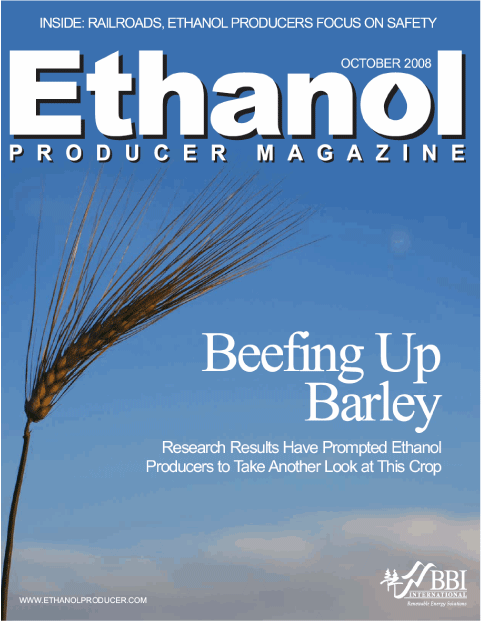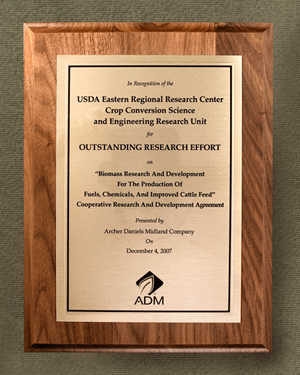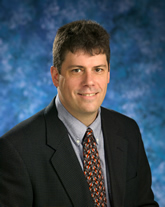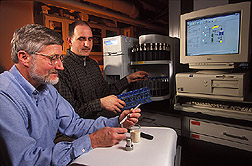Crop Conversion Science and Engineering Research Unit
Dr. Kevin B. Hicks, Research Leader
Jacqueline F. Kenny, Program Support Assistant
Voice: (215) 233-6580
Fax: (215) 233-6406
TO LEARN MORE ABOUT CCSE, USE THE "BROWSE BY SUBJECT" ITEMS ON THE UPPER LEFT HAND SIDE OF THIS PAGE.
In the Spotlight
Biofuels Engineering Process Technology
 |
Our own John (Nhuan) Nghiem has co-authored a very important book on biofuels.
Click here for more information. |
___________________________________
Breaking News
Siemens Partners With USDA ARS to Improve Conversion of Second-Generation Feedstocks to Chemicals and Biofuels
Atlanta, GA - Siemens Energy & Automation, Inc. and the United States Department of Agriculture's (USDA) Agricultural Research Service (ARS) have entered into a Cooperative Research and Development Agreegment (CRADA) that will improve the processes used to convert second generation, non-food-based, biofuel feedstocks, including perennial grasses, animal wastes and agricultural residues such as corn stover, into liquid bio-fuel intermediates, such as bio-oil.
As part of the CRADA, Logical Innovation of Richmond, VA, will work with researchers at USDA/ARS's Eastern Regional Research Center (ERRC) in Wyndmoor, PA, to improve on pyrolysis oil production via innovative control technologies.
Click here to read more about it!
___________________________________
Beefing Up Barley
Research Results Have Prompted Ethanol Producers to take Another Look at This Crop
 |
In the ethanol world barley may be corn’s poor cousin, but research efforts have made it an attractive feedstock option in the U.S. mid-Atlantic region.
Read more about the research in the October 2008 issue of Ethanol Producer Magazine. |
___________________________________
 |
Congratulations to Dr. Akwasi Boateng on being Elected a Fellow of the American Society of Mechanical Engineers |
Dr. Akwasi Boateng has been elected a Fellow of the American Society of Mechanical Engineers. The Fellow grade of membership recognizes exceptional engineering achievements and contributions to the engineering professtion. Dr. Boateng was recognized for his pioneering research on combustion and related thermochemical processing technologies.
Congratulations Dr. Boateng!!!
___________________________________
 |
Biodiesel Journal Highlights ERRC Biodiesel and Barley Ethanol Research in March/April Issue |
Click here to read all about it!
__________________________________
 |
Congratulations to Dr. Kevin Hicks as this year's NAA Senior Research Scientist of the Year! |
Dr. Hicks is honored for his "Outstanding research accomplishments during his entire research career and for outstanding leadership of a very productive ARS Research Unit for the last twenty years."
___________________________________
National Corn Growers Association visit ERRC
.gif)
Dr. David Johnston discusses new energy saving enzymatic methods to produce starch and ethanol from corn.
Members of the National Corn Growers Association's Research and Business Development Team visited the Eastern Regional Research Center on March 20 to learn about the research being conducted to produce food and fuel (as well as feeds and fibers) from corn and corn stover. The NCGA members were given a research tour of ERRC's state-of-the-art laboratories and pilot plants to see the latest advances in research on fuel ethanol, biodiesel, pyrolysis and gasification-derived fuels, and the many food and feed type coproducts produced during biofuels processes. ERRC is conducting research for the sustainable production of biofuels from agricultural feedstocks so that we do not overuse food crops or harm the environment from biofuels production.
Click here for more photos.
_____________________________________
Fueling America - Without Petroleum
 Engineers Neil Goldberg (left) and Akwasi Boateng operate a fluidized-bed thermochemical reactor they designed and built for converting crop residues into renewable bio-oils and hydrogen fuels. (D767-1) Engineers Neil Goldberg (left) and Akwasi Boateng operate a fluidized-bed thermochemical reactor they designed and built for converting crop residues into renewable bio-oils and hydrogen fuels. (D767-1)
The demand for alternatives to petroleum-based fuels is steadily rising.
Corn and soybeans - the deminant feedstocks for ethanol and biodiesel production in the United States - grow well in the central regions of the country. But are these the only available sources? What options exist for U.S. growers in other regions? How can corn and soybean feedstocks be improved?
Scientist at the Eastern Regional Research Center (ERRC) in Wyndmoor, Pennsylvania, are answering these and other questions about renewable fuels production. Their research focuses on four major areas: biodiesel, ethanol, thermochemical processes, and cost analysis.
"For years, ERRC has been a committed participant in alternative fuels research," says center director John Cherry. "This is a particularly exciting time, because so much of our research work is being adopted and used by industry."
Read more about the research in the April 2007 issue of Agricultural Research Magazine.
__________________________________
CCSE Receives the Outstanding Research Effort Award
 
On December 4, 2007, members of ERRC's Crop Conversion Science & Engineering Research Unit received an Outstanding Research Effort award from Archer Daniels Midland Company to celebrate the successful conclusion of a three year CRADA entitled "Biomass Research and Development for the Production of Fuels, Chemicals, and Improved Cattle Feed". Pictured are (from left) Mr. Andrew McAloon, Senior Cost Engineer, ERRC; Dr. Michael Cecava, Director, Feed Technology Research, ADM Research; Dr. Charles Abbas, Director of Yeast and Renewables Research, ADM; Dr. Frank Taylor, Research Chemical Engineer and Project PI, ERRC; Dr. Kyle Beery, Senior Process Engineer, ADM Research; Dr. Kevin Hicks, Research Leader, ERRC; Ms. Jhanel Wilson, Chemical Engineer, ERRC. Not pictured: Dr. Tae Hyun Kim, Research Assoicate, present address, Iowa State University; Dr. Rolando Flores, Research Agricultural Engineer, present address, University of Nebraska, Lincoln.
______________________________
ARS Outstanding Early Career Research Scientist of the Year for 2005

David Johnston —
Phone modem | Broadband
News release (2/7/06)
Contact information and research details
ARS presented awards to eight "Early Career Scientists of the Year" who have earned their doctorates within the past decade and have been with the agency for seven years or less. The highest of these honors is the Herbert L. Rothbart Outstanding Early Career Research Scientist of the Year, which for 2005 was awarded to David Johnston, a research food technologist with the ARS Crop Conversion Science and Engineering Research Unit in Wyndmoor, Pa.
Johnston was honored for developing novel, environmentally sustainable biochemical and engineering processes that are improving the way corn is processed into foods and fuels around the world. He has been nominated for inclusion in the Presidential Early Career Awards for Scientists and Engineers. (More about Johnston's research)
____________________________________
Pectin Extraction from Citrus and Sugar Beets
Low-Value Pectin's a Natural for Making High-Value Products

Chemists Marshall L. Fishman (left) and Hoa K. Chau prepare orange peels for flash extraction of pectin using microwave heating under pressure. (D702-1)
At ARS's Eastern Regional Research Center (ERRC) in Wyndmoor, Pennsylvania, researchers in the Crop Conversion Science and engineering Research Unit are at work on pectin, a polysaccharide component in the cell walls of fruits and vegetables.
Polysaccharides are polymers made up of many simple carbohydrates (sugars) linked together into long, continuous molecules. Pectin is currently valued for use as a gelling and thickening agent, beverage stabilizer, and fat substitute..
Read more about the research in the February 2007 issue of Agricultural Research Magazine.
__________________________________
New Varieties and Techniques
Make Barley Better For Fuel and Food

Chemist Robert Moreau (left) and biologist Mike Powell prepare samples to analyze edible oils and nutraceuticals in barley fractions using HPLC-MS methods.
(K11938-1)
New varieties of barley could help solve two national problems: energy dependence and obesity. That’s because some parts of barley are excellent for making fuel ethanol, while other parts are nutritious and naturally low in calories.
High starch content is needed to produce ethanol, while soluble fibers such as beta-glucan and other types of fiber have been found to possess health benefits for people. Now scientists are developing ways to maximize the benefits found in some special barley varieties.
Researchers at the Eastern Regional Research Center (ERRC) in Wyndmoor, Pennsylvania, want to reduce the cost of fuel ethanol and make it available nationwide. Most ethanol production facilities use corn as starting material, or “feedstock,” and not surprisingly, they’re located in the Corn Belt, not on the East and West Coasts, where demand for fuel ethanol is increasing. It’s too costly for most coastal states to ship corn from the Midwest to a local ethanol plant, so it makes sense for these “corn-deficient” states to use locally grown grains as alternatives. Barley, which grows well in these regions, may be the answer—once a couple of problems are solved.
Read more about the research in the July 2005 issue of Agricultural Research Magazine.
|